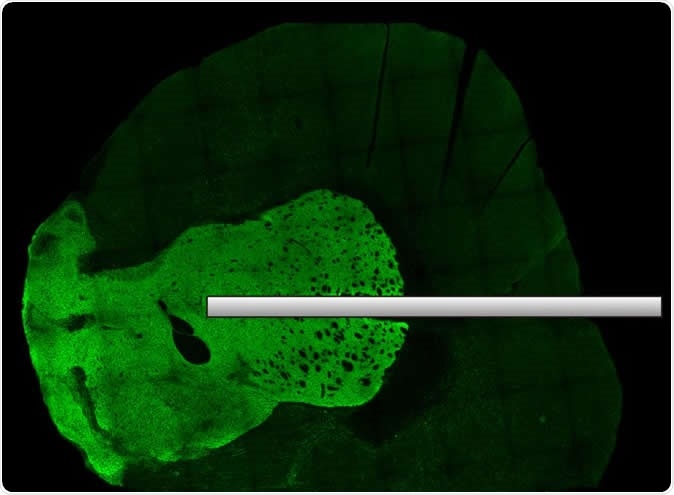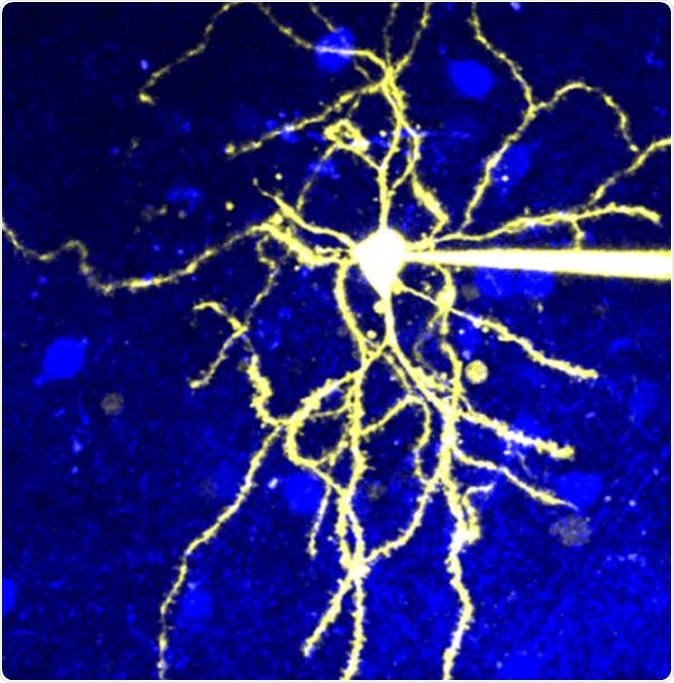Psychosis is a condition with an ancient past, from Hippocrates back in 500 BC to modern times. It is described in those writings as a state of delusions, hallucinations, and abnormal thinking patterns, which are “an existential threat” to an imbalanced mind.
In the current study, a team of Japanese researchers has come up with a theory that the basis of psychosis, at least in part, is abnormal signaling in the ventral striatum. This area is deep in the brain and operates during the cognitive process called discrimination learning.

Activity in neuronal tissue can be optically recorded with fiber optics. Image: © 2020 Yagishita et al.
Conditioning and discrimination learning
The researchers looked at reward learning behavior in mice. The aim of the experiment is to see how mice predict rewards in the environment or learn which behaviors to repeat. It was based upon tone reward conditioning.
Conditioning occurs when an animal is trained to do the same task when stimulated with a particular stimulus. On the other hand, when an animal distinguishes between different stimuli, which it has been trained to recognize as different, and chooses the one which will present a reward, discriminative learning is at work.
This type of reaction involves dopamine release, and its binding to the dopamine 1 receptor (D1R) elicits the sensation of expecting a reward. The researchers were looking for a second dopamine signal that is found only in case the expected reward does not occur – reward omission.
This dopamine signal was thought to be in specific ventral striatum neurons containing D2R. This type of receptor is the primary target for almost 100% of antipsychotic medications.

Microscopic image of a neuron that expresses D2R. Image Credit: © 2020 Yagishita et al.
Dopamine dips and discrimination learning
The study showed that reward omission causes a dopamine dip – a fall in dopamine levels, which is found to last less than a second. Such dips help in discrimination learning – the process of discerning previously learned punishments and rewards, or being able to respond differently to different stimuli.
The investigators turned to optogenetics to understand how dips in dopamine helped discrimination learning. Optogenetics helps activate artificial light-sensitive proteins by laser beams, precisely modulated to turn the neuron off or on. Using this technique, they artificially manipulated the dips and observed how the mice estimated rewards.
They found that D1R stimulation causes generalized reactions to stimuli. On the other hand, D2R stimulation causes dopamine dips, resulting in the expansion of dendritic spines, which then send signals inside the D2R-expressing spiny projection neurons. “We searched for several years before we discovered that discrimination learning was the cognitive process that refines reward learning following dopamine dips,” says researcher Sho Yagishita.
Dopamine dips and psychosis
The next step was to find out how this phenomenon was related to psychosis. The researchers gave the mice a drug called methamphetamine and looked at the resulting changes in neuronal activity. They found a reduction in both dopamine dips and discrimination learning. The outcome was exaggerated behavior and un-cued dopamine responses – just as is seen in psychotic human beings. The administration of a DR2-blocking antipsychotic drug prevented these abnormal changes.
Yagishita explains the findings: “If D2R signaling and discrimination learning is impaired, subjects may be unable to assign an appropriate significance to objects or people in their environment, and their fears or insecurities may fill in the gap. For example, persecutory delusions arise from mistakenly assigning malevolent intent to strangers who pose no threat.”
Implications
The authors suggest that the results of their study throw new light on the mechanism of psychosis, by showing how an antipsychotic drug acting on the DR2 receptors reverses the signs of a drug that induces psychosis by its specific action of restoring the dopamine dips and thereby normalizing discrimination learning.
Their theory is that psychotic or schizophrenic symptoms are due to impaired discrimination learning. Comparing the process of D2R-mediated discrimination learning to inbuilt correctors, researcher Haruo Kasai says, “The brain seems to have an intrinsic capacity for fantasy or delusional thinking, but D2R discrimination learning that help us to correct our misjudgments.” Without these corrective signals, he says, “We can risk losing contact with reality and may enter a downward spiral of pathology.”
The next step for the researchers is to model a general learning paradigm that can help show how clinical cognitive disorders arise, and can also lay down new principles to generate advanced artificial intelligence.
Journal reference:
Iino, Y., Sawada, T., Yamaguchi, K. et al. Dopamine D2 receptors in discrimination learning and spine enlargement. Nature (2020). https://doi.org/10.1038/s41586-020-2115-1